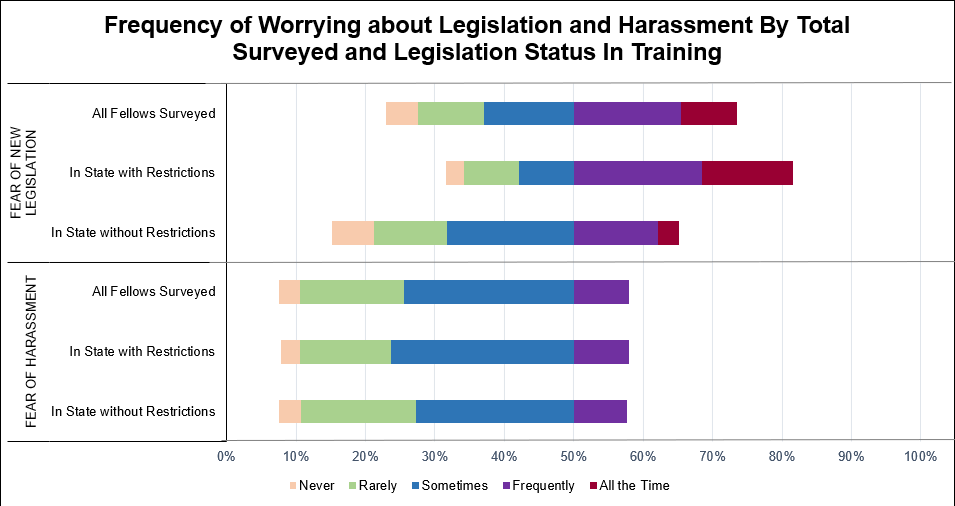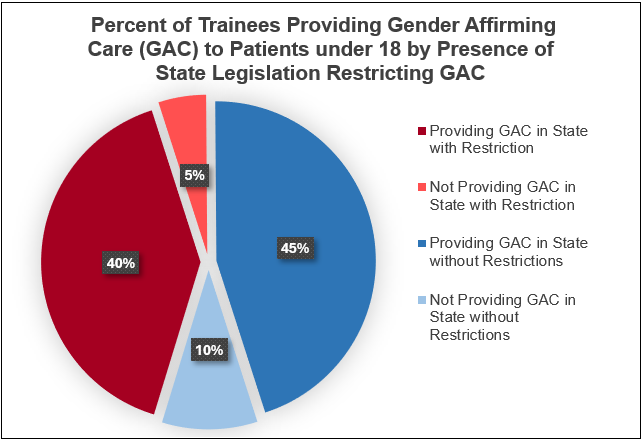Adolescent Medicine 4: Hot Topics
Session: Adolescent Medicine 4: Hot Topics
124 - Impact of Legislation Restricting Gender Affirming Care for Minors on Adolescent Medicine Fellowship Training and New AM Providers
Monday, April 28, 2025
7:00am - 9:15am HST
Publication Number: 124.5329
Amy M. Wright, Golisano Children's Hospital at The University of Rochester Medical Center, Rochester, NY, United States; Jamie Mehringer, University of Rochester School of Medicine and Dentistry, Rochester, NY, United States; Susan Yussman, University of Rochester School of Medicine and Dentistry, Rochester, NY, United States; Olle Jane Z. Sahler, Golisano Children's Hospital at The University of Rochester Medical Center, Rochester, NY, United States
.jpg)
Amy M. Wright, D.O. (they/she)
Adolescent Medicine Fellow
Golisano Children's Hospital at The University of Rochester Medical Center
Rochester, New York, United States
Presenting Author(s)
Background: In the US, legislation restricting gender-affirming care (GAC) for minors has increased since 2020. Studies have described the effect of legislation on patients, parents and experienced providers, but not on trainees interested in learning to provide GAC.
Objective: As “sexuality and gender” is a core knowledge domain in Adolescent Medicine (AM) training, we surveyed current and recently graduated (2022 or later) AM fellows about their interest in GAC and the impact of legislation on their education, emotional experience, and career plans.
Design/Methods: We created an anonymous survey in REDCap to assure secure data collection. As the population was small, we protected confidentiality by eliminating identifiers (e.g. program name/location), and only queried field of residency, year of AM training/graduation, and status of GAC legislation in their state of training (options: “shield” laws protect access; restrictive legislation proposed; restrictions in effect; none in place). A public link was emailed to 125 eligible respondents. Responses were grouped by legislation: 1) shield laws/no restrictions, and 2) active/pending restrictions.
Results: Of 65 respondents (response rate 52%), 68% were current trainees and 46% trained in states with restrictions. The majority (84%) affirmed that GAC was important to learn in fellowship. During fellowship, 86% trained to prescribe affirming hormones to minors; 66% learned to prescribe puberty blockers. Confidence prescribing GAC was significantly different (P=0.0056) between trainees in states and without (89%) and with restrictions (56%). Trainees in states with restrictions reported greater fear of harassment/personal safety (46%) than those in states without restrictions (27%). Of those (n=23) who experienced passage of restrictions during training, 86% reported a negative impact. Among all respondents, more worried frequently or all the time about increasing legislation in their first job (42%) than about facing harassment (15%); 41% would change jobs or move if new legislation restricted GAC in their state.
Conclusion(s): GAC is of great interest to AM trainees and can strongly impact their choice of training program or first AM position. Restrictive legislation and harassment lead to emotional distress, negative training experiences, and lower confidence prescribing GAC. Since AM specialists have expertise extending beyond GAC, possible AM physician migration could reduce patient access to both primary care and subspecialty care for conditions such as eating disorders, substance use disorders, and sexual/reproductive concerns.
Anticipated Confidence Prescribing Gender-Affirming Care (GAC) to Minors by Legislation Status
.png) When AM fellows were asked if they anticipate being confident providing GAC independently by graduation from their fellowship, there was a significant (P=0.0056) difference between trainees from states with legislative restrictions (in place or anticipated) and those in states without (shield laws or no legislation in place).
When AM fellows were asked if they anticipate being confident providing GAC independently by graduation from their fellowship, there was a significant (P=0.0056) difference between trainees from states with legislative restrictions (in place or anticipated) and those in states without (shield laws or no legislation in place).Frequency of Worrying about Legislation and Harassment Among AM Fellows and New Providers By Total Surveyed and Legislation Status During Training
 When surveyed about current fellows' desired first job or new providers' first position, respondents consistently affirmed that they worry more often (frequently or all the time) about increasing legislation that restricts GAC for minors than they worry about facing harassment for providing GAC. When trainees were in a state with restrictions, this had a greater impact on their frequency of worry than those from states without restrictions.
When surveyed about current fellows' desired first job or new providers' first position, respondents consistently affirmed that they worry more often (frequently or all the time) about increasing legislation that restricts GAC for minors than they worry about facing harassment for providing GAC. When trainees were in a state with restrictions, this had a greater impact on their frequency of worry than those from states without restrictions.Fellows Training to provide Gender Affirming Care (GAC) to Patients under 18 by Presence of State Legislation Restricting GAC
 This chart is showing both the relatively equal distribution of respondents from states without restrictions (55%) and those with restrictions (45%), as well as how many of those trainees in each legislative climate is learning to provide GAC to patients under 18.From this, data can be further extrapolated to show a slight difference between the percent of respondents from states with restrictions providing GAC (89%) than the percent of respondents from states without restrictions (82%) providing GAC.
This chart is showing both the relatively equal distribution of respondents from states without restrictions (55%) and those with restrictions (45%), as well as how many of those trainees in each legislative climate is learning to provide GAC to patients under 18.From this, data can be further extrapolated to show a slight difference between the percent of respondents from states with restrictions providing GAC (89%) than the percent of respondents from states without restrictions (82%) providing GAC. 
